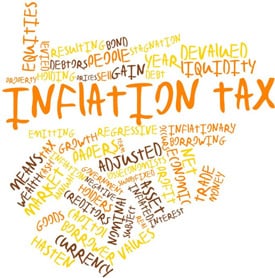President Joe Biden’s so-called “Build Back Better” agenda was dealt a likely fatal blow on Sunday. Moderate Democrat Joe Manchin announced that he would oppose his party’s massive $2 trillion spending bill.
That effectively kills it in its current form.
Chief among Senator Manchin’s reasons for opposing the Biden administration’s far-reaching spending scheme is inflation.
Price levels in the economy are already rising at the fastest pace in 40 years. The so-called "Build Back Better" bill would grow federal budget deficits by $260 billion, according to the Congressional Budget Office – adding even more fuel to the inflation fire.
 “The inflation that I was concerned about, it’s not transitory. It’s real,” Manchin told Fox News Sunday viewers. “What we need to do is get our financial house in order.”
“The inflation that I was concerned about, it’s not transitory. It’s real,” Manchin told Fox News Sunday viewers. “What we need to do is get our financial house in order.”
Of course, there is nothing on the table legislatively that would accomplish that feat.
The national debt is pushing past $29 trillion. Far from being on a path to eventually pay it down, multi-trillion-dollar annual deficits are slated to be run in the years ahead that will add to it.
That’s the unstated reason why the Federal Reserve has been so eager to see inflation move higher – and so reluctant to tighten monetary policy. You see, inflation makes otherwise unsustainable debt loads sustainable through the process of depreciating their real value.
As long as interest rates remain artificially suppressed well below the inflation rate, borrowing huge amounts of money is a fantastic deal for Uncle Sam. Debt can work out great for leveraged speculators in financial markets as well.
Until it doesn’t.
A reckoning looms for those who have overextended themselves with the help of the Fed’s easy money policies. At some point interest rates will rise, either because the Fed seeks to tame inflation or because inflation expectations force markets to reprice risk.
Asset classes that have been heavily bid up by leveraged speculation include stocks, real estate, and even cryptocurrencies. When the next round of deleveraging takes hold, these and other financial assets will be vulnerable to forced selling.
By contrast, precious metals markets have seen very little speculative buying of late.
While demand for physical bullion remains robust, futures trading that determines spot prices has been dominated by large institutional short sellers.
Meanwhile, most retail investors will continue to shun gold and cling to their stocks and bonds until something in those markets breaks.
Inflation has already broken the bond market in one sense. Real bond yields are sitting historic lows. An inflation rate of 6.8%, per the latest Consumer Price Index report, means that a 10-year Treasury note yielding a nominal 1.4% sports a pitiful real yield of -5.4%.
It will be a compounding disaster for bondholders as the corrosive effects of inflation persist. Now even Fed Chairman Jerome Powell admits that inflation can’t be regarded as “transitory” anymore.
As inflation continues to eat away at financial assets, a secular sentiment shift toward hard assets, including gold and silver, may be in store.

